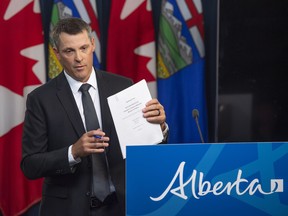Quebec has put more than $150 million towards becoming self-sufficient in all four food groups, all year around
Article content
Staple Theory is a weekly look at Canada’s resource economy and the forces that shape it. Read it first in the FP Economy newsletter.
Quebec Premier François Legault, who earned a master’s degree in business administration and co-founded Transat A.T. Inc. before entering politics, is about to test one of the most cherished commandments of economics.
David Ricardo (1772-1823) popularized the idea at the core of all trade agreements: comparative advantage. Ricardo observed that it was ridiculous for England to produce wine when plentiful Portuguese vintages were both cheaper and better. Conversely, Portugal had no business making its own cloth, since its textile industry was no match for Britain’s cotton spinners. Everyone would be better off if England imported its wine from Portugal, and if Portugal obtained its cotton from England.
It took some time, but eventually politicians saw the wisdom of Ricardo’s teachings. It helped that attempts to defy the rule of comparative advantage tend to go badly: the Newfoundland government’s embarrassing attempt in the late 1980s to become self-sufficient in cucumbers, for example. Free-trade agreements replaced tariff walls, culminating in China’s addition to the World Trade Organization in 2001.
Advertisement
This advertisement has not loaded yet, but your article continues below.
Article content
Ricardo wouldn’t like many of the current trends in trade. Protectionism is back, thanks to the Great Recession and Donald “Tariff Man” Trump’s four years in the White House. Now, the COVID-19 crisis has some policymakers thinking that an inefficient textile industry might be better than no textile industry if the country with the comparative advantage in the making of masks and medical gowns refuses to send you any at the outset of deadly pandemic.

‘Made in Quebec’ strawberries offer hope for food autonomy

Biden’s ‘Buy American’ order likely to have little impact on Canadian firms, but U.S. stimulus may lift their fortunes

Canada could be stuck with holdovers from Trump for a long time — podcast

The Great Rethink: If Canada wants to stay a trading nation it needs to up its game
The federal budget promises hundreds of millions of dollars for bioengineering, as Canada’s embrace of globalization left it without the manufacturing capacity necessary to make COVID-19 vaccines. Several provinces have initiated programs aimed at boosting home-grown supplies of food, none more aggressively than Quebec, which has put more than $150 million to become self-sufficient in all four food groups, all year around.
Folly? Advances in greenhouse technology combined with cheap hydro-generated electricity and shifts in spending habits suggest that it’s possible. Still, even if the cost of heating a state-of-the-art greenhouse in Quebec during the winter might be relatively cheap, it’s still not as cheap as in sunny Mexico, where fruit and vegetable farmers warm their crops for free. Legault’s bet will come down to whether Quebecers are willing to pay more for their food. Modern industrial agriculture is built on the notion that consumers only care about price. We’re about to see if that’s true.
This article first appeared in the FP Economy newsletter. Sign up here to get it delivered to your inbox every Monday.
Advertisement
This advertisement has not loaded yet, but your article continues below.
Fresh fruit in February: Quebec’s premier about to test a cherished commandment of economics
2021-05-06 10:00:15





